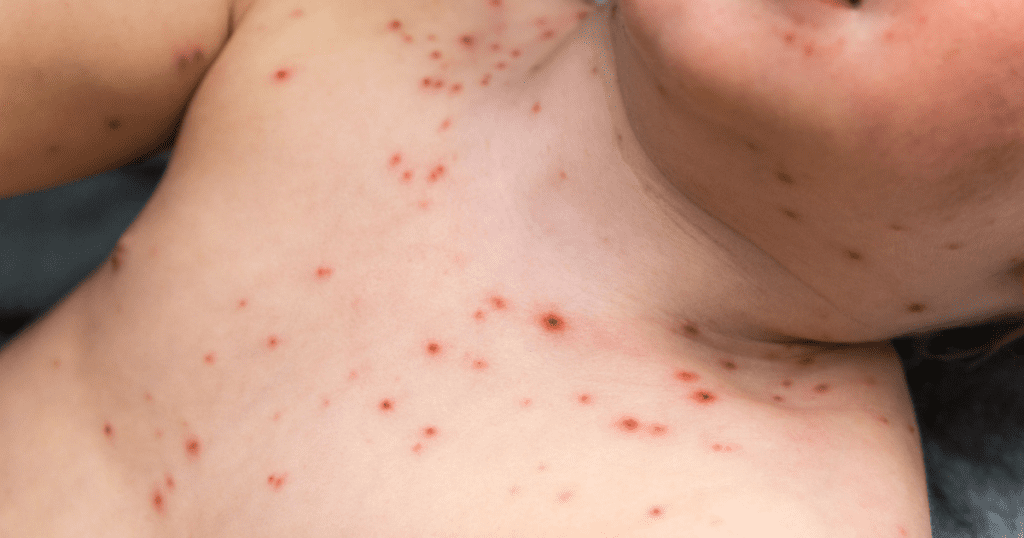Chickenpox is a common childhood illness that many parents have to deal with at some point. While the itchy rashes and discomfort are difficult for children to endure, there’s a more serious risk that parents need to be aware of — one that could make things much worse. A Facebook post by a concerned mother serves as a crucial reminder about why ibuprofen should never be used to treat chickenpox.

Let’s explore the dangers of using ibuprofen to manage chickenpox symptoms, the story behind this alarming incident, and safer alternatives for treating the infection.
What Is Chickenpox?
Chickenpox, caused by the varicella-zoster virus, is a highly contagious infection that primarily affects children but can also strike adults. It begins with red, itchy skin rashes that quickly develop into fluid-filled blisters. These blisters eventually break and form scabs, a process that takes about one to two weeks to heal.
Symptoms typically appear 10 to 21 days after exposure to the virus. While the condition often resolves without complications, it’s the itch and discomfort that make it so challenging, especially for younger children who might struggle with the temptation to scratch the irritated skin.
Who Is Most Likely to Get Chickenpox?
Although chickenpox can affect people of all ages, it is most common among children under the age of 12. According to statistics, around 90% of all cases occur in children, with those younger than two years being the most susceptible. People are at higher risk if they haven’t been vaccinated, work in close-contact environments like schools or daycare centers, or live with children who may bring the virus home.
How Does Chickenpox Spread?
The varicella-zoster virus spreads through direct contact with an infected person’s blisters or by inhaling airborne particles released when they cough or sneeze. The virus is highly contagious, meaning that a person with chickenpox is capable of spreading it one to two days before the rash appears, up until all blisters have scabbed over.
Because of its contagious nature, anyone who comes into contact with an infected person is at risk of contracting the virus, making it important to know how to manage symptoms safely.
The Story That Sparked Outrage: A Mother’s Warning
In 2016, Haley Lyons from Warrington, England, shared a Facebook post that quickly went viral, warning parents about the dangers of treating chickenpox with ibuprofen. Haley’s son, Lewis, had come down with chickenpox and developed a high fever. Following advice from four different doctors, Haley gave her son ibuprofen to help relieve the symptoms. Unfortunately, instead of helping, the ibuprofen worsened Lewis’s condition, causing a serious infection known as septicemia.

Haley was shocked to learn that ibuprofen, a common anti-inflammatory, can have dangerous interactions with chickenpox. After rushing her son to Alder Hey Children’s Hospital, she was informed that ibuprofen can make chickenpox go deeper into the skin, leading to severe complications.
In her Facebook post, Haley wrote:
“Chickenpox is going around again. Can I please remind people NOT to give your children nurofen/ibuprofen… This type of medicine is an anti-inflammatory; it reacts with chickenpox, making them go deeper into the skin tissue.”
Haley’s story highlighted the importance of knowing what medications are safe to use when treating chickenpox and why parents should be cautious when following medical advice without further research.
Why Ibuprofen Can Be Dangerous for Chickenpox
Ibuprofen is a type of nonsteroidal anti-inflammatory drug (NSAID) often used to reduce inflammation and pain. However, when it comes to chickenpox, ibuprofen can have unintended effects that worsen the condition. Several studies, including one published in the British Journal of General Practice, suggest that NSAIDs like ibuprofen increase the risk of severe skin and soft-tissue infections when used in cases of chickenpox.
It is thought that ibuprofen impairs the body’s natural immune response, reducing its ability to fight off bacterial infections. In the case of chickenpox, this can lead to deeper skin infections or even life-threatening complications like septicemia, as happened with Lewis.
Parents should also avoid giving children aspirin, as it has been linked to Reye’s syndrome — a rare but serious condition that affects the brain and liver, and can be fatal.
Safer Alternatives for Treating Chickenpox Symptoms

With ibuprofen and aspirin off the table, what are the safer ways to manage chickenpox symptoms? Here are some recommended treatments to ease discomfort and help children through the illness:
- Use Acetaminophen for Fever Relief
The Centers for Disease Control and Prevention (CDC) recommend acetaminophen (commonly known as Tylenol) for reducing fever and relieving pain in children with chickenpox. Acetaminophen is safe for most people, including pregnant women and children over the age of two months. Always consult with a doctor before giving any medication to a child. - Soothe the Itch Without Scratching
Scratching chickenpox blisters can lead to secondary infections, so it’s crucial to manage the itch without damaging the skin. Some helpful methods include:- Tapping or patting the itchy areas instead of scratching.
- Taking cool oatmeal baths to soothe irritated skin.
- Applying calamine lotion to itchy spots for relief.
- Wearing loose, breathable clothing made of cotton to reduce skin irritation.
- Using antihistamines like Benadryl (with your doctor’s approval) to reduce itchiness.
- Stay Hydrated and Rest
Keeping the body hydrated is essential for fighting off viral infections like chickenpox. Encourage children to drink plenty of fluids, such as water, clear broth, or electrolyte solutions. Adequate rest is also key to allowing the body to recover from the virus. - Avoid Harsh Skin Products
Harsh soaps and skin products can further irritate the skin during chickenpox. Opt for mild, fragrance-free soaps and moisturizers to keep the skin clean and hydrated without causing additional discomfort.
Conclusion
Haley Lyons’s story serves as a crucial reminder to parents everywhere: always be cautious when it comes to treating chickenpox, and avoid using ibuprofen. While chickenpox can be incredibly uncomfortable for children, taking the wrong medication can turn a common illness into a life-threatening condition. Stick to safe options like acetaminophen, calamine lotion, and antihistamines, and always consult with your healthcare provider if you’re unsure of the best course of treatment.
Chickenpox may be a rite of passage for many children, but as Haley’s story shows, taking the right precautions can make all the difference. Stay informed, avoid ibuprofen, and keep your little ones safe during their recovery from this itchy virus.


